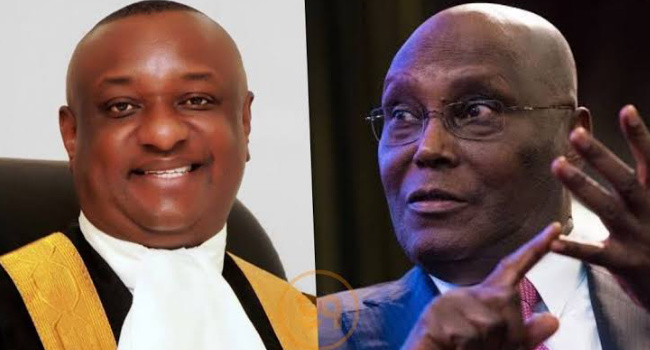
Prof. Mike Ozekhome (SAN) representing former Vice President Atiku Abubakar in the alleged money laundering case filed by Festus Keyamo (SAN) before a Federal High Court sitting in Abuja has urged the Code of Conduct Bureau (CCB) to refrain from interfering in the subject matter since complainant has voluntarily submitted the suit to a competent court of law for adjudication.
In a letter dated April 7 and addressed to CCB Chairman, titled, attempt to over-reach suit No. FHC/ABJ/CS/84/2023: Festus Keyamo (SAN) VS. Alh. Atiku Abubakar, ICPC and EFCC, Ozekhome said, “Upon being served with the originating process in the said suit, our client – through us – promptly responded by filing a Statement of Defence as well as a Preliminary Objection thereto”.

Keyamo, in his suit filed at the Federal High Court, Abuja, joined the CCB, Independent Corrupt Practices and Other Related Offences Commission (ICPC) and the Economic and Financial Crimes Commission (EFCC) as 2nd, 3rd and 4th defendants respectively, while Atiku is the first defendant.
In the suit, Keyamo sought a declaration of the court that the 1st defendant (Atiku) is under a legal obligation to make available to the 2nd, 3rd and 4th defendants, for the purpose of aiding their investigation, information available to him in respect of a certain bank account belonging to a company named Marine Float and other accounts of two undisclosed companies, which information he disclosed to a certain close aide of his called Michael Achimugu, as to how the said accounts were used as a “Special Purpose Vehicles” to secretly divert and misappropriate public funds between 1999 and 2007 when he (Atiku Abubakar) served as Vice President of Nigeria.
The CCB was said to have extended an invitation to Keyamo to enable him adopt his petition and to provide any additional information that may be relevant to the investigation in the matter.
The Bureau requested that Keyamo should come with one, Michael Achimugu, to assist with enquiries regarding his attachments to his petition.
But, Ozekhome in his letter, urged the CCB boss to advise and direct Keyamo to pursue his pending litigation against Atiku Abubakar to its logical conclusion.
“We assure you that we are eagerly waiting for him there.”, he said and added that, upon been served with the suit marked, FHC/ABJ/CS/84/2023: Festus Keyamo (SAN) VS. Alh. Atiku Abubakar, ICPC and EFCC, to the former Vice president through his chambers, we promptly responded by filing a Statement of Defence as well as a Preliminary Objection thereto”.
The letter said, issues have been duly joined in the matter between Keyamo and Atiku Abubakar, adding that, the matter is now sub judice.
“You will therefore appreciate our surprise to read in the media that Mr. Keyamo has reportedly responded to the invitation of your esteemed Bureau purportedly to shed more light on his complaints to the Bureau, which far preceded and formed the very basis of his pending suit, as aforesaid.
“Our reasons are obvious: it is highly inappropriate for a party to a suit to take any extra-judicial steps, or to embark on any course of action that is either tantamount to, or calculated to undermine the authority and integrity of the court, which is dominus litis over the proceedings.
“Such behavior is as condemnable as it is unacceptable. It is strongly frowned upon, by courts of law, as it has the potential of over-reaching the court, the other party (our client) and foisting or the court, a fait accompli. In fact, it smacks of contempt of court, albeit ex facie curiae.
“To that extent, the Supreme Court has severally deprecated and condemned such actions in no certain terms. A few of such instances will suffice.
In OJUKWU v. MILITARY GOVERNOR OF LAGOS STATE (1986) NGSC 8, the Apex Court held as follows:
“Once a dispute has arisen between a person and the government or authority and the dispute has been brought before the court, thereby invoking the judicial powers of the State, it is the duty of the government to allow the law to take its course or allow the legal and judicial process run its full course .
“The courts expect the utmost respect of the law from the government itself which rules by the law . . . In the area where the rule of the law operates, the rule of self-help by force is abandoned.
“See also REGISTERED TRUSTEES APOSTOLIC CHURCH V. OLOWOLENI (1990) 4 NWLR Pt. 158 Pg. 514 at 537, where the Supreme Court, per Nnaemeka-Agu, JSC, held thus:
“Once parties have turned their dispute over to the courts for determination, the right to resort to self-help ends. So it is not permissible for one of the parties to take any step during the pendency of the suit which may have the effect of fostering upon a Court a situation of complete helplessness or which may give the impression that the Court is being used as a mere subterfuge to tie the hands of one party while the party helps himself extra judicially.
“Both parties are to await the result of the litigation and the appropriate order of the court before acting further.”
Again, in OYEGBEMI & ANOR v. AROMIRE & ORS (2012) LPELR-7942 (CA), the Court of Appeal, per Helen Moronkeji Ogunwumiju, JCA (as she then was) held thus:
“Parties cannot present the court with a fait accompli to overreach the other party. The principle is settled that the court cannot be hamstrung by a party who changes the status quo during litigation”.
“Where however you persist in your enterprise of investigating this subjudice matter currently pending before a court of competent jurisdiction, we shall be left with no alternative than to activate the judicial process against your goodself”, he said in the letter.








